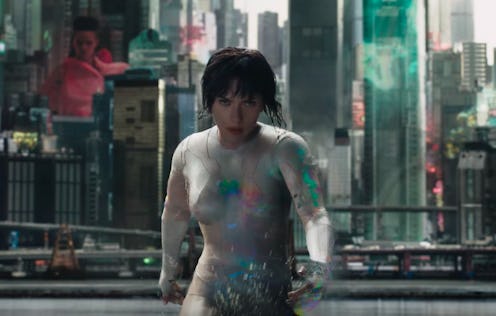
Although much of the conversation around the new movie Ghost in the Shell is about Scarlett Johanasson, a white actor, starring in a Japanese manga-inspired film, there's another key aspect being overlooked: the feminist win the movie represents for women in the action genre. As the lead in Ghost in the Shell, Johansson's character, Major, isn't sexualized; a robot with a human brain, fighting crime in a futuristic Japan, she has no love interest, and no defined sexuality. All together, it's a groundbreaking move for the action genre.
If you've seen the trailers, Major not being sexualized might sound odd, considering that Johansson appears in a skin-tight bodysuit that acts as Major's actual nude body. But, as a mechanical being, Major isn't made to be sexual. There are no lingering shots of her breasts, no seductive cuts to her lips. The first time Major takes off her coat to reveal her naked body, the camera makes sure to show her figure in a full frame. Audience members can be taken aback by Major's apparent nudity if they choose to be, but the camera doesn't objectify her.
Even more, there is no love interest for Major in Ghost in the Shell, and the subject of attraction is barely touched upon. In fact, the only time Major's nudity is sexualized at all is during a clearly unromantic situation, when she is in the presence of her male partner, Batou, who looks away when he realizes she isn't wearing clothes.
Every time Major takes off her clothes in Ghost in the Shell, it's in battle, or suiting up for a fight. For Major, the act of putting on and taking off clothing is not sexual — it's necessary and convenient. It sounds simple, but this element is actually pretty huge. Women in action movies are constantly being sexualized, no matter how badass they are. In the Star Trek franchise, for instance, one of Uhura's first scenes is of her getting undressed. And even Johansson's Black Widow in the Marvel movies, arguably the most dominant female action character today, was introduced first as a sexual object, not a hero. As Tony Stark's secretary with a mysterious past, Black Widow's first appearance in Iron Man 2 even featured photos of her in lingerie.
Usually, to avoid being accused of simply sexualizing bodies for the sake of nothing, action movies try to incorporate sex into the plot. James Bond seduces potential suspects and allies, Wonder Woman has some sexy banter with Batman to distract him, and Black Widow uses her womanly ways to spy on Iron Man. In Ghost in the Shell, however, Major never uses sex as a weapon. In fact, it's not clear Major even understands sexuality at all. And that makes her a first for an action heroine.
The fact that Johansson is the movie's star makes this even more of a major deal. Despite starring as Black Widow in the most successful superhero franchise ever (the Marvel Cinematic Universe), Johansson has yet to lead an action movie franchise by herself. It's clear that, with Ghost in the Shell, she has every intention of changing that fact, and she's doing so in a truly significant, feminist way.
Of course, any time you put any person on screen, it's impossible to ensure that he or she is not objectified, and no doubt, some young audience members will giggle awkwardly the first time they see Major in her birthday suit. But that's not because the movie encourages it — and that, believe it or not, is a huge step forward. Ghost in the Shell might have its problems, but happily, overly sexualizing Major isn't one of them.